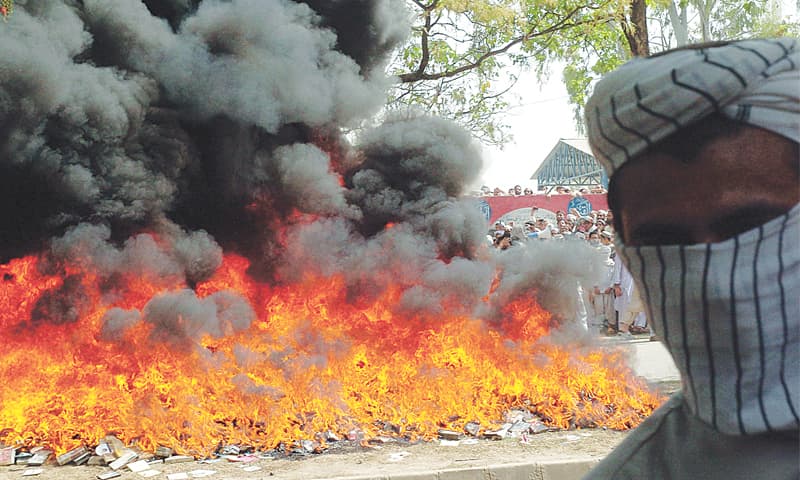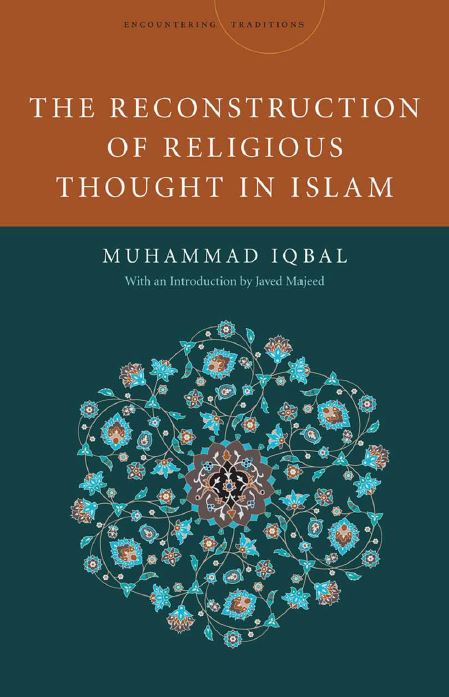
Some of these turbans are spreading ignorance and are responsible for the deceived youth’s blood that is going to waste in horrible terrorist attacks or false acts of heroism such as the sit-in disaster at the Red Mosque in Pakistan in 2007, which ended, according to some accounts, in the deaths of eight hundred people. Today, Pakistan is no longer thought of without images coming to mind of Taliban schools and extremist religious parties, of beards and white robes (imported from the land of war and disbelief) flooding the streets with their rioting. Is this the Pakistan that its founders wanted and dreamed of in 1947?
ASK THOSE CROWDS the same question: have you read the writings of Muḥammad Iqbal, one of the spiritual fathers of the state of Pakistan? Here are some of Iqbal’s religious stances, which were mentioned in his famous book The Reconstruction of Religious Thought in Islam. As we review them we ask the contemporary advocates of takfīr:[1] Do they dare to declare its author to be a kāfir at a time when a door has been opened for symbolic interpretation of that which is hidden, and for bringing religion closer to the developments of modern times?
Regarding the resurrection Muḥammad Iqbal has this to say:
The resurrection, therefore, is not an external event. It is the consummation of a life-process within the ego.[2]
Regarding Heaven and Hell, he argues that:
Heaven and Hell are states, not localities. Their descriptions in the Qur’an are visual representations66 of an inner fact, i.e. character. Hell, in the words of the Qur’an, is “God’s kindled fire which mounts above the hearts”- the painful realization of one’s failure as a man. Heaven is the joy of triumph over the forces of disintegration. There is no such thing as eternal damnation in Islam. The word “eternity” used in certain verses, relating to Hell, is explained by the Qur’an itself to mean only a period of time [Qur’ān LXXVIII, 23]. Time cannot be wholly irrelevant to the development of personality. Character tends to become permanent; its reshaping must require time. Hell, therefore, as conceived by the Qur’ an, is not a pit of everlasting torture inflicted by a revengeful God; it is a corrective experience which may make a hardened ego once more sensitive to the living breeze of Divine Grace. Nor is Heaven a holiday. Life is one and continuous. Man marches always onward to receive ever fresh illuminations from an Infinite Reality which” every moment appears in a new glory”. And the recipient of Divine illumination is not merely a passive recipient. Every act of a free ego creates a new situation, and thus offers further opportunities of creative unfolding.[3]
As for the revelation:
Indeed the way in which the word Wahy (inspiration) is used in the Qur’ an shows that the Qur’ an regards it as a universal property of life; though its nature and character are different at different stages of the evolution of life. The plant growing freely in space, the animal developing a new organ to suit a new environment, and a human being receiving light from the inner depths of life, are all cases of inspiration varying in character according to the needs of the recipient, or the needs of the species to which the recipient belongs. Now during the minority of mankind psychic energy develops what I call prophetic consciousness- a mode of economizing individual thought and choice by providing ready-made judgements, choices, and ways of action.[4]
And he says about the Seal of the Prophethood:
In Islam prophecy reaches its perfection in discovering the need of its own abolition. This involves the keen perception that life cannot for ever be kept in leading strings; that, in order to achieve full self-consciousness, man must finally be thrown back on his own resources.[5]
In discussing the republican system he argues the following:
We too one day, like the Turks, will have to re-evaluate our intellectual inheritance … According to Sunni Law, the appointment of an Imam or Khalifah is absolutely indispensable. The first question that arises in this connexion is this – Should the Caliphate be vested in a single person? Turkey’s Ijtihād is that according to the spirit of Islam the Caliphate or Imamate can be vested in a body of persons, or an elected Assembly. The religious doctors of Islam in Egypt and India, as far as I know, have not yet expressed themselves on this point. Personally, I believe the Turkish view is perfectly sound. It is hardly necessary to argue this point. The republican form of government is not only thoroughly consistent with the spirit of Islam, but has also become a necessity in view of the new forces that are set free in the world of Islam.[6]
After the abolition of the Caliphate in Turkey he makes the following judgment:
The truth is that among the Muslim nations of today, Turkey alone has shaken off its dogmatic slumber, and attained to self-consciousness. She alone has claimed her right of intellectual freedom; she alone has passed from the ideal to the real – a transition which entails keen intellectual and moral struggle.[7]
And on Islamic unity:
For the present every Muslim nation must sink into her own deeper self, temporarily focus her vision on herself alone, until all are strong and powerful to form a living family of republics.[8]
Iqbal goes on to say, in his criticism of jurisprudence:
I have no doubt that a deeper study of the enormous legal literature of Islam is sure to rid the modem critic of the superficial opinion that the Law of Islam is stationary and incapable of development. Unfortunately, the conservative Muslim public of this country is not yet quite ready for a critical discussion of Fiqh, which, if undertaken, is likely to displease most people, and raise sectarian controversies.[9]
He also says, concerning the schools of jurisprudence, that
with all their comprehensiveness these systems are after all individual interpretations, and as such cannot claim any finality. I know the Ulema of Islam claim finality for the popular schools of Muhammadan Law, though they never found it possible to deny the theoretical possibility of a complete Ijtihiid. I have tried to explain the causes which, in my opinion, determined this attitude of the Ulema; but since things have changed and the world of Islam is confronted and affected today by new forces set free by the extraordinary development of human thought in all its directions, I see no reason why this attitude should be maintained any longer.[10]
He says in criticism of the hadith:
we must distinguish traditions of a purely legal import from those which are of a non-legal character. With regard to the former, there arises a very important question as to how far they embody the pre-Islamic usages of Arabia which were in some cases left intact, and in others modified by the Prophet. It is difficult to make this discovery, for our early writers do not always refer to pre-Islamic usages. Nor is it possible to discover that usages, left intact by express or tacit approval of the Prophet, were intended to be universal in their application.[11]
He then presents a vision for a modern jurisprudence:
The transfer of the power of Ijtihad from individual representatives of schools to a Muslim legislative assembly which, in view of the growth of opposing sects, is the only possible form Ijma’ can take in modem times, will secure contributions to legal discussion from laymen who happen to possess a keen insight into affairs. In this way alone can we stir into activity the dormant spirit of life in our legal system, and give it an evolutionary outlook.[12]

Suggested Reading
He thus distinguishes between the religion of collective faith as it was practiced in the past and the religion of individual exploration and the open mind:
Broadly speaking religious life may be divided into three periods. These may be described as the periods of “Faith”, “Thought”, and “Discovery.” In the first period religious life appears as a form of discipline which the individual or a whole people must accept as an unconditional command without any rational understanding of the ultimate meaning and purpose of that command. This attitude may be of great consequence in the social and political history of a people, but is not of much consequence in so far as the individual’s inner growth and expansion are concerned. Perfect submission to discipline is followed by a rational understanding of the discipline and the ultimate source of its authority. In this period religious life seeks its foundation in a kind of metaphysics- a logically consistent view of the world with God as a part of that view. In the third period metaphysics is displaced by psychology, and religious life develops the ambition to come into direct contact with the Ultimate Reality. It is here that religion becomes a matter of personal assimilation of life and power; and the individual achieves a free personality, not by releasing himself from the fetters of the law, but by discovering the ultimate source of the law within the depths of his own consciousness.[13]
The fate of every one of these paragraphs would be to be condemned as kufr (disbelief) today, and the blood of its author would be shed. So we make the following challenge to the shaykhs of the traditionalist religion, and the leaders of the fundamentalist movements: Do you dare, gentlemen, to pronounce takfīr upon Muḥammad ‘Abduh and Muḥammad Iqbal?
[1] See Glossary.
[2] Muhammad Iqbal, The Reconstruction of Religious Thought in Islam, Stanford, California, 2013, p.96.
[3] Muhammad Iqbal, Op. cit., p.98.
[4] Op. cit., p.100.
[5] Op. cit., p.101.
[6] Op. cit., p.121, 124-5.
[7] Op. cit., p.128.
[8] Op. cit., p.126.
[9] Op. cit., p.131
[10] Op. cit., p.133-4.
[11] Op. cit., p.136.
[12] Op. cit., p.138.
[13] Op. cit., p.143.
Main image: Extremists at the Red Mosque in Islamabad torch video cassettes, music CDs and DVDs in their call for applying Islamic Law.

